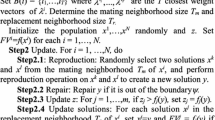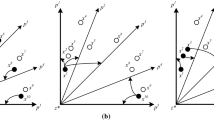Abstract
MOEA/D decomposes the multiobjective optimization problem into a number of subproblems. However, one subproblem’s requirement for exploitation and exploration varies with the evolutionary process. Furthermore, different subproblems’ requirements for exploitation and exploration are also different as the subproblems have been solved in distinct degree. This paper proposes a decomposition based multiobjective evolutionary algorithm with self-adaptive mating restriction strategy (MOEA/D-MRS). Considering the distinct solved degree of the subproblems, each subproblem has a separate mating restriction probability to control the contributions of exploitation and exploration. Besides, the mating restriction probability is updated by the survival length at each generation to adapt to the changing requirements. The experimental results validate that MOEA/D-MRS performs well on two test suites.




Similar content being viewed by others
References
Bader J, Zitzler E (2011) Hype: an algorithm for fast hypervolume-based many-objective optimization. Evol Comput 19:45–76
Beume N, Naujoks B, Emmerich M (2007) SMS-EMOA: multiobjective selection based on dominated hypervolume. Eur J Oper Res 181:1653–1669
Cai X, Li Y, Fan Z, Zhang Q (2014) An external archive guided multiobjective evolutionary algorithm based on decomposition for combinatorial optimization. IEEE Trans Evol Comput 19:508–523
Cai X, Yang Z, Fan Z, Zhang Q (2017) Decomposition-based-sorting and angle-based-selection for evolutionary multiobjective and many-objective optimization. IEEE Trans Cybern 47:2824–2837
Chiang TC, Lai YP (2011) MOEA/D-AMS: Improving MOEA/D by an adaptive mating selection mechanism. In: Evolutionary computation. IEEE, New Orleans, pp 1473–1480
Dai C, Wang Y (2015) A new decomposition based evolutionary algorithm with uniform designs for many-objective optimization. Appl Soft Comput 30:238–248
Deb K (2001) Multi-objective optimization using evolutionary algorithms. Wiley, New York
Deb K, Pratap A, Agarwal S, Meyarivan T (2002) A fast and elitist multiobjective genetic algorithm: NSGA-II. IEEE Trans Evol Comput 6:182–197
Gong M, Wang Z, Zhu Z, Jiao L (2017) A similarity-based multiobjective evolutionary algorithm for deployment optimization of near space communication system. IEEE Trans Evol Comput 21:878–897
Gu F, Cheung YM (2018) Self-organizing map-based weight design for decomposition-based many-objective evolutionary algorithm. IEEE Trans Evol Comput 22:211–225
Huband S, Barone L, While L, Hingston P (2005) A scalable multi-objective test problem toolkit. Lect Notes Comput Sci 3410:280–295
Ishibuchi H, Yu S, Masuda H, Nojima Y (2017) Performance of decomposition-based many-objective algorithms strongly depends on Pareto front shapes. IEEE Trans Evol Comput 21:169–190
Jiang S, Yang S (2016) An improved multiobjective optimization evolutionary algorithm based on decomposition for complex Pareto fronts. IEEE Trans Cybern 46:421–437
Jiang S, Yang S, Wang Y, Liu X (2018) Scalarizing functions in decomposition-based multiobjective evolutionary algorithms. IEEE Trans Evol Comput 22:296–313
Ke L, Zhang Q, Battiti R (2013) MOEA/D-ACO: A multiobjective evolutionary algorithm using decomposition and ant colony. IEEE Trans Cybern 43:1845–1859
Ke L, Zhang Q, Battiti R (2014) Hybridization of decomposition and local search for multiobjective optimization. IEEE Trans Cybern 44:1808–1820
Li H, Zhang Q (2009) Multiobjective optimization problems with complicated Pareto sets, MOEA/D and NSGA-II. IEEE Trans Evol Comput 13:284–302
Li H, Zhang Q, Chen Q, Zhang L, Jiao YC (2016) Multiobjective differential evolution algorithm based on decomposition for a type of multiobjective bilevel programming problems. Knowl-Based Syst 107:271–288
Li H, Zhang Q, Deng J (2016) Biased multiobjective optimization and decomposition algorithm. IEEE Trans Cybern 47:52–66
Li K, Fialho A, Kwong S, Zhang Q (2014) Adaptive operator selection with bandits for a multiobjective evolutionary algorithm based on decomposition. IEEE Trans Evol Comput 18:114–130
Li K, Kwong S, Zhang Q, Deb K (2015) Interrelationship-based selection for decomposition multiobjective optimization. IEEE Trans Cybern 45:2076–2088
Li K, Zhang Q, Kwong S, Li M, Wang R (2014) Stable matching-based selection in evolutionary multiobjective optimization. IEEE Trans Evol Comput 18:909–923
Li X, Zhang H, Song S (2018) A self-adaptive mating restriction strategy based on survival length for evolutionary multiobjective optimization. Swarm Evol Comput. https://doi.org/10.1016/j.swevo.2018.02.009
Li Y, Zhou A, Zhang G (2014) An MOEA/D with multiple differential evolution mutation operators. In: Proceedings of the IEEE congress on evolutionary computation (CEC 2014), Beijing, China, 2014c. IEEE, pp 397–404
Lin Q et al (2017) A diversity-enhanced resource allocation strategy for decomposition-based multiobjective evolutionary algorithm. IEEE Trans Cybern 48:2388–2401
Lin Q et al (2016) Adaptive composite operator selection and parameter control for multiobjective evolutionary algorithm. Inf Sci 339:332–352
Lin Q, Tang C, Du Z, Li J, Chen J, Ming Z (2017) A novel adaptive control strategy for decomposition-based multiobjective algorithm. Comput Oper Res 78:94–107
Lin S, Lin F, Chen H, Zeng W (2016) A MOEA/D-based multi-objective optimization algorithm for remote medical. Neurocomputing 220:5–16
Liu HL, Chen L, Zhang Q, Deb K (2018) Adaptively allocating search effort in challenging many-objective optimization problems. IEEE Trans Evol Comput 22:433–448
Ma X et al (2014) MOEA/D with opposition-based learning for multiobjective optimization problem. Neurocomputing 146:48–64
Ma X, Liu F, Qi Y, Li L, Jiao L, Liu M, Wu J (2014) MOEA/D with Baldwinian learning inspired by the regularity property of continuous multiobjective problem. Neurocomputing 145:336–352
Ma X, Zhang Q, Tian G, Yang J, Zhu Z (2018) On Tchebycheff decomposition approaches for multiobjective evolutionary optimization. IEEE Trans Evol Comput 22:226–244
Mashwani WK, Salhi A (2014) Multiobjective memetic algorithm based on decomposition. Appl Soft Comput 21:221–243
Ming M, Wang R, Zha Y, Zhang T (2017) Pareto adaptive penalty-based boundary intersection method for multi-objective optimization. Inf Sci 414:158–174
Qi Y, Bao L, Ma X, Miao Q, Li X (2016) Self-adaptive multi-objective evolutionary algorithm based on decomposition for large-scale problems: a case study on reservoir flood control operation. Inf Sci 367–368:529–549
Qi Y, Hou Z, Li H, Huang J, Li X (2015) A decomposition based memetic algorithm for multi-objective vehicle routing problem with time windows. Comput Oper Res 62:61–77
Qi Y, Ma X, Liu F, Jiao L, Sun J, Wu J (2014) MOEA/D with adaptive weight adjustment. Evol Comput 22:231–264
Sato H (2014) Inverted PBI in MOEA/D and its impact on the search performance on multi and many-objective optimization. In: Genetic and evolutionery computation conference (GECCO 2014), Vancouver, BC, Canada ACM, pp 645–652
Tan YY, Jiao YC, Li H, Wang XK (2013) MOEA/D+ uniform design: a new version of MOEA/D for optimization problems with many objectives. Comput Oper Res 40:1648–1660
Trivedi A, Srinivasan D, Pal K, Saha C, Reindl T (2017) Enhanced multiobjective evolutionary algorithm based on decomposition for solving the unit commitment problem. IEEE Trans Ind Inf 11:1346–1357
Trivedi A, Srinivasan D, Sanyal K, Ghosh A (2017) A survey of multiobjective evolutionary algorithms based on decomposition. IEEE Trans Evol Comput 21:440–462
Venske SM, Gonçalves RA, Benelli EM, Delgado MR (2016) ADEMO/D: an adaptive differential evolution for protein structure prediction problem. Expert Syst Appl 56:209–226
Wang L, Zhang Q, Zhou A, Gong M, Jiao L (2016) Constrained subproblems in a decomposition-based multiobjective evolutionary algorithm. IEEE Trans Evol Comput 20:475–480
Wang R, Zhou Z, Ishibuchi H, Liao T, Zhang T (2018) Localized weighted sum method for many-objective optimization. IEEE Trans Evol Comput 22:3–18
Wang Z, Zhang Q, Li H, Ishibuchi H, Jiao L (2017) On the use of two reference points in decomposition based multiobjective evolutionary algorithms. Swarm Evol Comput 34:89–102
Wang Z, Zhang Q, Zhou A, Gong M, Jiao L (2017) Adaptive replacement strategies for MOEA/D. IEEE Trans Cybern 46:474–486
Wu M, Li K, Kwong S, Zhang Q, Zhang J (2018) Learning to decompose: a paradigm for decomposition-based multiobjective optimization. IEEE Trans Evol Comput. https://doi.org/10.1109/TEVC.2018.2865931
Wu M, Li K, Kwong S, Zhou Y, Zhang Q (2017) Matching-based selection with incomplete lists for decomposition multiobjective optimization. IEEE Trans Evol Comput 21:554–568
Xing H, Wang Z, Li T, Li H, Qu R (2017) An improved MOEA/D algorithm for multi-objective multicast routing with network coding. Appl Soft Comput 59:88–103
Yang S, Jiang S, Jiang Y (2016) Improving the multiobjective evolutionary algorithm based on decomposition with new penalty schemes. Soft Comput 21:1–15
Yuan Y, Xu H, Wang B, Zhang B, Yao X (2016) Balancing convergence and diversity in decomposition-based many-objective optimizers. IEEE Trans Evol Comput 20:180–198
Zhang H, Zhang X, Gao XZ, Song S (2016) Self-organizing multiobjective optimization based on decomposition with neighborhood ensemble. Neurocomputing 173:1868–1884
Zhang J, Tang Q, Li P, Deng D, Chen Y (2016) A modified MOEA/D approach to the solution of multi-objective optimal power flow problem. Appl Soft Comput 47:494–514
Zhang Q (2015) Multiobjective evolutionary algorithm based on decomposition for 3-objective optimization problems with objectives in different scales. Soft Comput 19:157–166
Zhang Q, Li H (2007) MOEA/D: a multiobjective evolutionary algorithm based on decomposition. IEEE Trans Evol Comput 11:712–731
Zhang Q, Liu W, Li H (2009) The performance of a new version of MOEA/D on CEC09 unconstrained MOP test instances. In: Proceedings of the IEEE congress on evolutionary computation (CEC 09), Trondheim, Norway IEEE, pp 203–208
Zhang Q, Zhou A, Jin Y (2008) RM-MEDA: a regularity model-based multiobjective estimation of distribution algorithm. IEEE Trans Evol Comput 12:41–63
Zhang Q, Zhou A, Zhao S, Suganthan PN, Liu W, Tiwari S (2008) Multiobjective optimization test instances for the CEC 2009 special session and competition. Special session on performance assessment of multi-objective optimization algorithms, technique report. University of Essex, Colchester Technological University, Singapore
Zhang YH, Gong YJ, Gu TL, Yuan HQ, Wei Z, Kwong S, Zhang J (2017) DECAL: decomposition-based coevolutionary algorithm for many-objective optimization. IEEE Trans Cybern. https://doi.org/10.1109/TCYB.2017.2762701
Zhao SZ, Suganthan PN, Zhang Q (2012) Decomposition-based multiobjective evolutionary algorithm with an ensemble of neighborhood sizes. IEEE Trans Evol Comput 16:442–446
Zheng J, Yu G, Zhu Q, Li X, Zou J (2016) On decomposition methods in interactive user-preference based optimization. Appl Soft Comput 52:952–973
Zhou A, Qu BY, Li H, Zhao SZ, Suganthan PN, Zhang Q (2011) Multiobjective evolutionary algorithms: a survey of the state of the art. Swarm Evol Comput 1:32–49
Zhou A, Zhang Q (2016) Are all the subproblems equally important? Resource allocation in decomposition-based multiobjective evolutionary algorithms. IEEE Trans Evol Comput 20:52–64
Zitzler E, Künzli S (2004) Indicator-based selection in multiobjective search. Lect Notes Comput Sci 3242:832–842
Zitzler E, Laumanns M, Thiele L (2001) SPEA2: improving the Strength Pareto evolutionary algorithm. Swiss Federal Institute of Technology (ETH) Zurich, Zurich
Zitzler E, Thiele L (1999) Multiobjective evolutionary algorithms: a comparative case study and the strength Pareto approach. IEEE Trans Evol Comput 3:257–271
Funding
This study was funded by China Aerospace Science and Technology Innovation Foundation (Grant number: CAST.No.JZ20160008), National Natural Science Foundation of China (Grant number: 61333003) and National Natural Science Foundation of China (Grant number: 61703382).
Author information
Authors and Affiliations
Corresponding author
Ethics declarations
Conflict of interest
All authors declare that they have no conflict of interest.
Ethical approval
This article does not contain any studies with human participants performed by any of the authors.
Additional information
Publisher’s Note
Springer Nature remains neutral with regard to jurisdictional claims in published maps and institutional affiliations.
Rights and permissions
About this article
Cite this article
Li, X., Zhang, H. & Song, S. A decomposition based multiobjective evolutionary algorithm with self-adaptive mating restriction strategy. Int. J. Mach. Learn. & Cyber. 10, 3017–3030 (2019). https://doi.org/10.1007/s13042-018-00919-w
Received:
Accepted:
Published:
Issue Date:
DOI: https://doi.org/10.1007/s13042-018-00919-w




